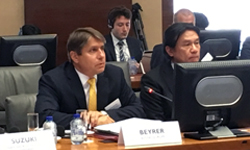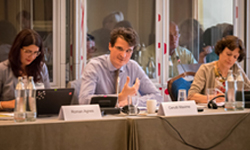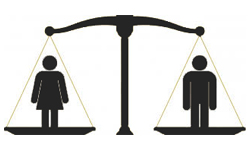BusinessEurope Headlines No. 2017-26
Markus J. Beyrer welcomes agreement at EU-Japan Business Roundtable

“I would like to congratulate the EU and Japan for reaching an agreement in principle during the EU-Japan free trade negotiations on 6 July”, Markus J. Beyrer told European Commissioner for Trade Cecilia Malmström and the Japanese State Minister for Foreign Affairs Kentaro Sonoura, in the presence of an audience comprised of European and Japanese business leaders on 11 July in Brussels. “This agreement comes at an important point in time”, Beyrer continued, “and it shows that Europe can and will manage globalisation”. He added that the European business community expects a high degree of ambition in terms of market access, removal of non-tariff barriers, public procurement, services, investment and geographic indications. “I look forward to the final details of the agreement, and I hope I can say that once the Free Trade Agreement (FTA) is ready, it will be the best FTA the EU has ever negotiated”, Beyrer concluded.
Contact: Maurice Fermont
European Pillar of Social Rights falls short of business key demand of partnership for reforms
 While sharing the aim of improving Europe’s competitiveness and therefore building a more inclusive and sustainable growth model, European business is concerned that the European Pillar of Social Rights falls short of what they have been calling for: a partnership for reforms. BusinessEurope outlined this message in an orientation paper published on 30 June, which is based on the key principles proposed by the European Commission on 26 April. Although EU action should focus on supporting Member States to develop social policies and on investments that facilitate job creation, there is a concern that the opposite will happen and the pillar will lead to policies and measures that actually keep employers from hiring more staff. A key consideration for BusinessEurope is that the pillar is not used to justify further EU social legislation that would hinder growth and jobs in Europe. Therefore, the pillar must fully respect the principle of subsidiarity. It should not interfere with national competences, including those of social partners.
While sharing the aim of improving Europe’s competitiveness and therefore building a more inclusive and sustainable growth model, European business is concerned that the European Pillar of Social Rights falls short of what they have been calling for: a partnership for reforms. BusinessEurope outlined this message in an orientation paper published on 30 June, which is based on the key principles proposed by the European Commission on 26 April. Although EU action should focus on supporting Member States to develop social policies and on investments that facilitate job creation, there is a concern that the opposite will happen and the pillar will lead to policies and measures that actually keep employers from hiring more staff. A key consideration for BusinessEurope is that the pillar is not used to justify further EU social legislation that would hinder growth and jobs in Europe. Therefore, the pillar must fully respect the principle of subsidiarity. It should not interfere with national competences, including those of social partners.
![]() Contact: Maxime Cerutti
Contact: Maxime Cerutti
Highlighting the dimension of services in trade policy
 BusinessEurope, the European Services Forum (ESF), Eurocommerce and DigitalEurope jointly organised the event “Liberalising global trade in Mode 5 Services: How much is worth?” on 12 July in Brussels. Mode 5 represents services embodied in goods. It refers to manufacturing firms purchasing, producing and selling services as part of their products. Lucian Cernat, the Chief Economist of the Directorate General for Trade of the European Commission (DG Trade), and Pascal Kerneis, Managing Director of ESF analysed the impact of Mode 5 on exports and on gross domestic product (GDP) growth. They also discussed ways to better adapt trade policy to a changing environment where the added value of Mode 5 services is becoming more and more prominent. A new note prepared by the Chief Economist of DG Trade on the matter is expected to be published by the end of July. BusinessEurope will remain actively engaged in the debate, analysing facts and proposing solutions that will reflect better the current reality in the trade policy of the EU.
BusinessEurope, the European Services Forum (ESF), Eurocommerce and DigitalEurope jointly organised the event “Liberalising global trade in Mode 5 Services: How much is worth?” on 12 July in Brussels. Mode 5 represents services embodied in goods. It refers to manufacturing firms purchasing, producing and selling services as part of their products. Lucian Cernat, the Chief Economist of the Directorate General for Trade of the European Commission (DG Trade), and Pascal Kerneis, Managing Director of ESF analysed the impact of Mode 5 on exports and on gross domestic product (GDP) growth. They also discussed ways to better adapt trade policy to a changing environment where the added value of Mode 5 services is becoming more and more prominent. A new note prepared by the Chief Economist of DG Trade on the matter is expected to be published by the end of July. BusinessEurope will remain actively engaged in the debate, analysing facts and proposing solutions that will reflect better the current reality in the trade policy of the EU.
Contact: Sofia Bournou
Promoting social partnership in employee training
 Employee trainings need to help improve the worker’s skills in the best possible way and also be effective and efficient for the companies. Investing in social partner cooperation on skills development is more important than ever, as digitalisation disrupts economies and redefines the organisation and their workers’ activities. These were the key messages stated by Maxime Cerutti, BusinessEurope Director of Social Affairs, during the first seminar of the European Social Partners’ project on Employee Training, which took place in Vienna on 5-6 July. The project seeks to explore the role of social partnership in employee training and will include two other seminars and a final conference. The project will be concluded in 2018.
Employee trainings need to help improve the worker’s skills in the best possible way and also be effective and efficient for the companies. Investing in social partner cooperation on skills development is more important than ever, as digitalisation disrupts economies and redefines the organisation and their workers’ activities. These were the key messages stated by Maxime Cerutti, BusinessEurope Director of Social Affairs, during the first seminar of the European Social Partners’ project on Employee Training, which took place in Vienna on 5-6 July. The project seeks to explore the role of social partnership in employee training and will include two other seminars and a final conference. The project will be concluded in 2018.
Contact: Robert Plummer
Circular economy industry platform: now with more than 50 examples online.
Submit your example today!
ETS study: Emission trading reform possible without risking carbon leakage
 “This study clearly shows that it is possible to have both an ambitious emissions trading system (ETS) reform and to avoid that EU industry sectors relocate or invest outside the EU”, BusinessEurope Director General Markus J. Beyrer said following the publication of a new study by FTI Consulting on the reform of the European Emissions Trading System (EU ETS) on 6 July. “We need the right combination of positions of the Commission, the Parliament and Council. This means a temporary doubling of the Market Stability Reserve together with a conditional 5% shift from auctioned to free allowances, and to not use free allowances to furnish support mechanisms such as the Innovation Fund or the New Entrants' Reserve.”, Beyrer added.
“This study clearly shows that it is possible to have both an ambitious emissions trading system (ETS) reform and to avoid that EU industry sectors relocate or invest outside the EU”, BusinessEurope Director General Markus J. Beyrer said following the publication of a new study by FTI Consulting on the reform of the European Emissions Trading System (EU ETS) on 6 July. “We need the right combination of positions of the Commission, the Parliament and Council. This means a temporary doubling of the Market Stability Reserve together with a conditional 5% shift from auctioned to free allowances, and to not use free allowances to furnish support mechanisms such as the Innovation Fund or the New Entrants' Reserve.”, Beyrer added.
![]()
![]() Contact: Leon de Graaf
Contact: Leon de Graaf
U-turn needed to avoid that work-life balance initiatives undermine growth and jobs
 The work-life balance measures proposed by the European Commission in the end of April need to be changed radically, if the objective is to underpin growth and employment. BusinessEurope has published a position paper explaining why we agree that more needs to be done to foster women’s employment rates and achieve a better work-life balance for women and men in a way that respects the choice of individuals and families. The most effective policy to accomplish this is to invest in care infrastructures in the EU Member States, including through public-private partnerships. Employers are highly concerned by the potential impact of the proposed directive. Granting new rights and a catalogue of leaves at EU level will not improve women’s situation on the labour markets. It will create unfinanced new costs that could end up reducing levels of protection for people who are in need. The risk of interfering with collective bargaining in the Member States should also be avoided, in particular when it comes to flexible working arrangements which are best organised between employers and workers at the company level.
The work-life balance measures proposed by the European Commission in the end of April need to be changed radically, if the objective is to underpin growth and employment. BusinessEurope has published a position paper explaining why we agree that more needs to be done to foster women’s employment rates and achieve a better work-life balance for women and men in a way that respects the choice of individuals and families. The most effective policy to accomplish this is to invest in care infrastructures in the EU Member States, including through public-private partnerships. Employers are highly concerned by the potential impact of the proposed directive. Granting new rights and a catalogue of leaves at EU level will not improve women’s situation on the labour markets. It will create unfinanced new costs that could end up reducing levels of protection for people who are in need. The risk of interfering with collective bargaining in the Member States should also be avoided, in particular when it comes to flexible working arrangements which are best organised between employers and workers at the company level.
![]() Contact: Guillaume Cravero
Contact: Guillaume Cravero
Preventing overlaps between chemical, product and waste regulation
 Inconsistencies and overlaps between chemicals, waste and product legislation pose serious challenges to industry, according to BusinessEurope Industrial Affairs Director Alexandre Affre. He adds that “the waste legislation should aim at ensuring safe and innovative waste management that results in cleaner waste streams and higher quality secondary raw materials”. A new position paper published by BusinessEurope on 5 July provides a set of recommendations on how to move forward. The main recommendations are: to focus on how to better implement existing regulation, to provide clarity and consistency in policy directions, and to avoid having recycling and other circular economy practices move outside of the EU with lower environmental standards, after which negative impacts would simply be re-imported. The six-page comment has been submitted to the targeted consultation of the European Commission and is available on the BusinessEurope website.
Inconsistencies and overlaps between chemicals, waste and product legislation pose serious challenges to industry, according to BusinessEurope Industrial Affairs Director Alexandre Affre. He adds that “the waste legislation should aim at ensuring safe and innovative waste management that results in cleaner waste streams and higher quality secondary raw materials”. A new position paper published by BusinessEurope on 5 July provides a set of recommendations on how to move forward. The main recommendations are: to focus on how to better implement existing regulation, to provide clarity and consistency in policy directions, and to avoid having recycling and other circular economy practices move outside of the EU with lower environmental standards, after which negative impacts would simply be re-imported. The six-page comment has been submitted to the targeted consultation of the European Commission and is available on the BusinessEurope website.
![]() Contact: Leon de Graaf
Contact: Leon de Graaf
Calendar 
- 17 July: 2nd round of Brexit talks
- 29-30 August 2017: Université d'été du MEDEF 2017, Paris
- 11 September: CETA provisional application
- 27-29 September: Globalism, bilateralism, economic patriotism? Challenges for societies and business - European Forum for New Ideas 2017, Sopot, Poland
